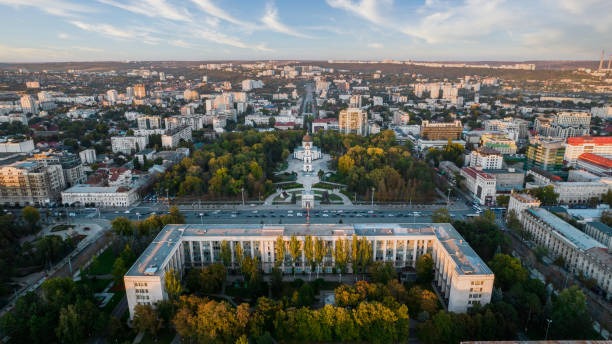Tuesday, 03/03/2026 | 16:17 GMT+7
The building sector is the largest consumer of energy in the Republic of Moldova, representing 53 percent of final energy consumption in 2022, with public sector buildings accounting for less than one-fifth and residential buildings for the rest. The crucial aspect that influences energy efficiency is the aging building stock as 72 percent of buildings were constructed between 1951 and 1990, and nowadays lack modern energy efficiency measures.
These statistics underscore the significant role that buildings play in energy demand, overshadowing other sectors such as transport (30 percent) and industry (8 percent), and highlight the urgency of addressing energy consumption in the building sector amid the energy crisis.

Drone view of Chisinau's buildings (Cre: iStock)
The International Forum on “Innovative Solutions for Scaling Up Energy Efficiency in Buildings” held in Chisinau on 3-4 October 2024, aimed at addressing this challenge by connecting the best technologies and practices for building new and retrofitting older assets, through innovative business models and identifying the needed investments for a more sustainable energy future in Moldova.
At the Forum, UNECE shared its extensive experience on the strategic vision and the necessary policy interventions to improve energy efficiency, which would involve:
Comprehensive regulatory frameworks in place, encompassing energy efficiency standards, building codes, and market structures that facilitate the electrification of key sectors like heating and transportation. These frameworks create a solid foundation for transitioning to cleaner energy systems while promoting the widespread adoption of energy-efficient technologies. Buildings, as essential components of future energy systems, play a critical role by not only consuming energy but also helping to balance energy demand and supply through on-site generation and active participation in the electricity market.
Guaranteeing access to modern energy-efficient technologies, with implementation strategies adapted to local conditions, such as the cost of capital, resource availability, and skill levels of the local workforce. This approach ensures that solutions are both economically feasible and effective in a longer term.
Tackling the behavioral barriers to fully unlock the energy efficiency potential and ensure broader adoption of available solutions. This includes addressing habits, perceptions, and resistance to change that often hinder the adoption of new technologies and practices.
Development of a national talent strategy, focusing on the training of future workers, enhancing the skills of the current workforce, and developing retention programmes. Such a strategy is vital as it ensures that a capable and knowledgeable labor force is available to support the transition to a more energy-efficient economy.
Bridging the digital divide, as many modern energy-efficient technologies rely on digital tools and infrastructure not only for their proper functioning, but importantly for seizing the system-wide optimization potential. Without equitable access, certain population groups could fall behind.
UNECE continues to assist its member States in scaling up energy efficiency, which is crucial to meeting global sustainability goals, supporting environmental protection, social inclusion, and economic development.
According to unece.org







